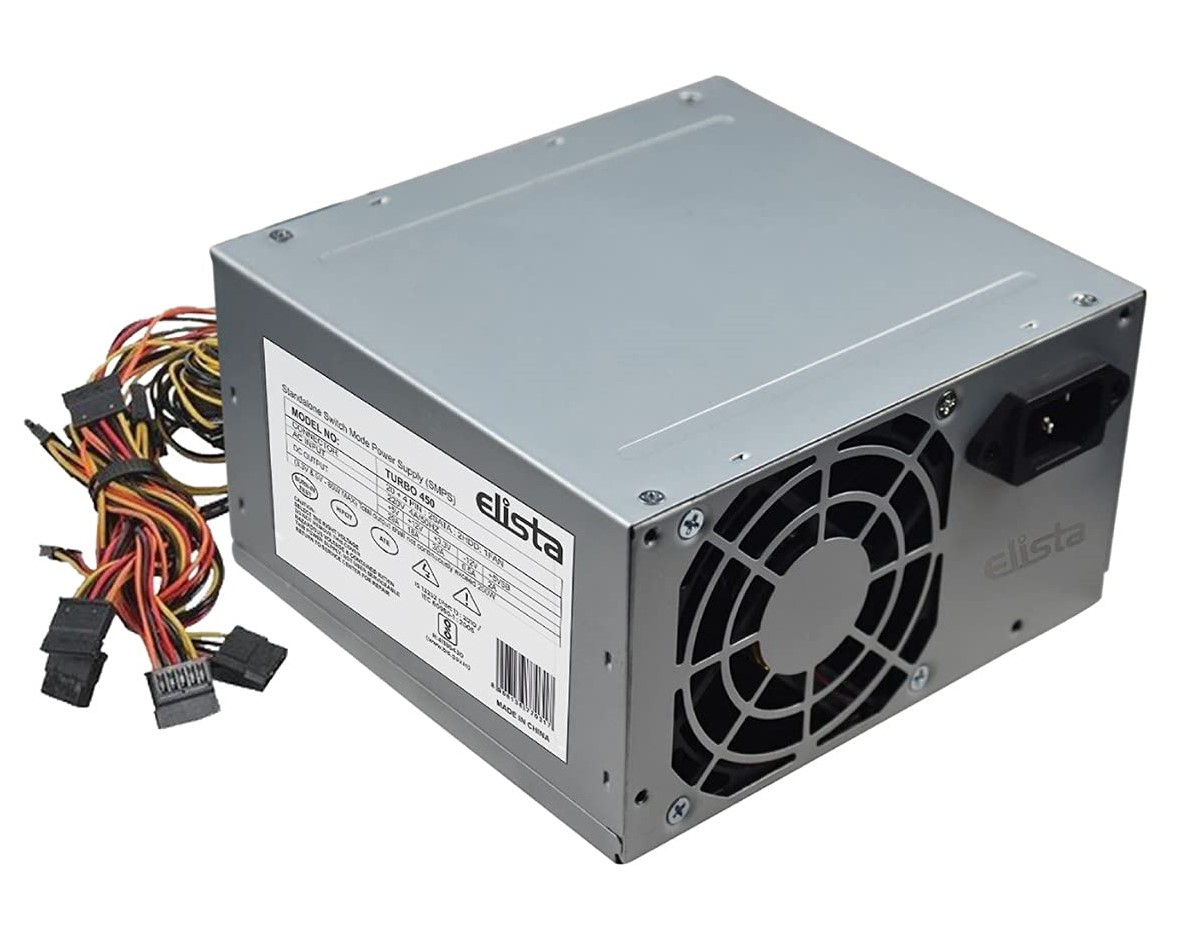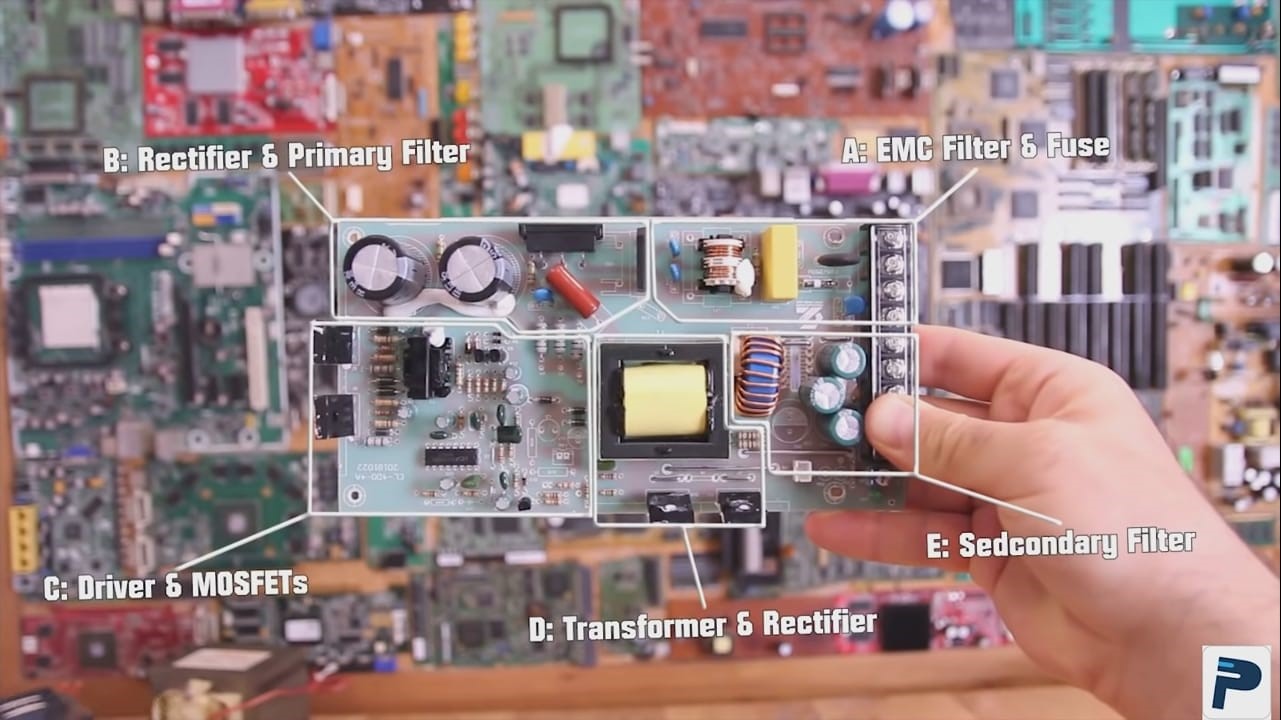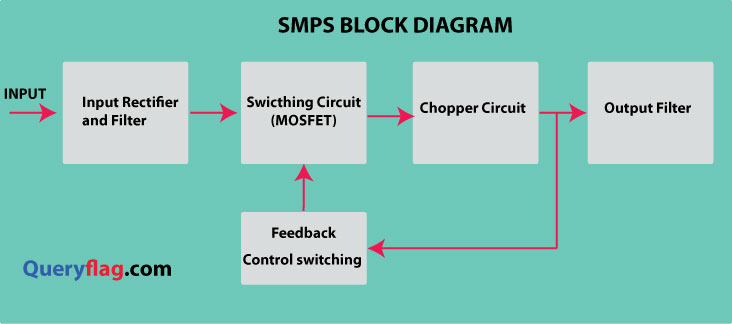.jpeg)
SMPS is the Short name for Switch Mode Power Supply (SMPS ), it is an electronic device that converts alternating current (AC 230 volts 50HZ) into direct current (DC) with a required voltage.

because in an SMPS switching device, MOSFET(Metal Oxide Field Effect Transistor) is switched off at a very fast rate, which is required to produce constant DC output. The output of SMPS has noiseless, and smooth, which is required for precise electronic devices like computers, TV, etc.

in SMPS, the Component of the PCB Circuit we have classified into five blocks as follows:
in this block fuse, NTC, Capacitor, and Chowk coil are connected. fused is used to prevent the circuit from excessive input voltage and in the Chowk coil, remove the noise of AC when passing through it.
in this block, a rectifier-like Bridge Circuit is used to convert AC into Dc and a capacitor is used for the primary filter. after passing AC through the Bridge circuit, then all waveforms of the negative side (lower) move to the Positive side as shown in the picture.
But our output is not an ideal DC because the AC component in the waveform is present therefore here we use a capacitor as a filter to remove this.
in this block, a MOSFET (metal oxide semiconductor field effect transistor) and an Integrated circuit (IC) are connected. MOSFET is a switch device that is converted low-frequency output dc (50 HZ) into a square waveform with high-frequency 20 KHz to 50 KHz).
the output of MOSFET is DC ClockPulse (Square Waveform) and next, it is passed through a Choper circuit which provides a constant voltage in output.
A secondary filter is a combination of a capacitor and an inductor (LC filter). when half pulse wave passes through this filter, a perfect dc as output is obtained.
If I say that SMPS converts AC to DC, then we can do this even with a rectifier, then why do we need SMPS, the answer is the different working methods of SMPS from linear rectifiers. Before knowing how SMPS works, let us know a little about rectifiers.
Electronic devices need precisely regulated voltage to operate but What happens in the rectifier or adaptor is that, with the help of a transformer, the input voltage is first reduced from 230 volts to 12 volts, then with the help of a bridge circuit, it converts ac to 12 volts dc, then we removed AC component from the output voltage by applying a capacitor filter so that we get smooth dc in the output.
But what if there is a fluctuation in the input voltage, in this case, the output voltage will also not remain stable as the input voltage gets fluctuated, so SMPS overcomes this shortcoming.

In SMPS first, the input voltage is not reduced to 12 V unlike linear rectifier but the input 230 V AC is converted to 230 V DC with the help of a rectifier and then this output 230 V DC is passed through a capacitor filter which reduces the AC component. this process is accrued in Block B ie “Rectifier and primary filter”
Then the output of Block B dc voltage is given as the input voltage to the MOSFET which turns on and off very rapidly. The on-and-off rate of a MOSFET is about 20 Hz.
Chopper circuit only works when an input voltage changes its value so here we used a switching device ie MOSFET.
Here is one thing I want clear that, the output of MOSFET has frequency but this is not AC, it generates Square Waveform which is a value of 0 or max voltage. This process is accrued in “Block C ie Drive & MOSFET. ”
The drive controls the frequency of MOSFET, and this frequency decides the output of the chopper circuit. so for getting a constant voltage Drive adjust the frequency of the MOSFET.
Now what is the chopper circuit is like a power transformer but it works only when the voltage of the input voltage keeps on changing continuously and the output voltage obtained from it depends on the frequency of the input voltage, meaning the higher the frequency, the higher the output voltage.
How much frequency provide to the chopper circuit so that it provides a constant voltage is decided by a feedback circuit in which the output of the chopper voltage is connected to the MOSFET, which adjusts the frequency of the MOSFET
in such a way that a constant output is obtained from the chopper, now The output of this chopper circuit is passed through a secondary filter to obtain a constant, precise dc voltage, which is required for critical devices such as TVs, computers, laptops, etc.
SMPS is used in electronic devices because they require very precise regulated voltage.
The efficiency of SMPS is around 70 to 75 percent which is
Which is more than the linear rectifier.
It is used in the following types of devices:-
#Computer: SMPS is used as a power supply unit in all computers such as desktops and laptops.
Different values of voltage are required in the computer, such as 3V, 5V, and 12V are required, which are supplied through SMPS.
# Home Appliance: It is used in household electronic devices such as TV, sound system, etc.
#Robotics & Automation: Voltage control and power distribution are easy in SMPS, hence it is used in robotics and smart electronics machines.
#Communication & network devices: Communication and network devices such as switches, routers, modems, etc. require stable voltage, so SMPS is used to supply power to all of them.
#Other use: SMPS is used to charge batteries in industries such as solar power and electric vehicles, etc.
Apart from this, SMPS is used in many equipment in the field of medicine such as monitoring devices and diagnosis devices, which require precisely regulated voltage.
The biggest difference between linear rectifiers and SMPS is voltage regulation.
In a linear rectifier, the voltage is regulated with the help of a voltage regulator IC while in SMPS the feedback voltage is given from the output to regulate the voltage so that the voltage is automatically balanced according to the load.
Let us see more about the difference between SMPS and linear rectifiers.
| Type | SMPS | Linear Rectifier |
|---|---|---|
| Conversion Method | First, the rectifiers convert the input voltage to DC then get the desired output from the chopper circuit and feedback control | First of all step down the voltage with the help of the transformer and then get the desired output with the help of bridge rectifier and capacitor filter. |
| Efficiency | High (70 to 75%) SMPS efficiency is higher then Linear rectifier | Low (40 to 50 %) |
| Voltage regulation | Easy Since the output voltage in SMPS is controlled by the feedback of the output voltage, it gives precisely regulated voltage. | Not Easy |
| Design Complexity | Complex in SMPS two filters, two rectifiers, and one power transformer (chopper circuit) are connected which are increase the complexity of circuit design. | Easy In a Linear rectifier, one transformer, bridge circuit, filter, and voltage regulator are connected which are easily connected in the circuit |
| Size | Smaller in size than the Linear rectifier | Large than SMPS |
| Heat Generate | efficiency of SMPS is high so lower heat generate than the Linear rectifier | |
| Cost | High | Low |